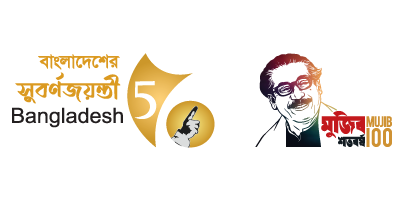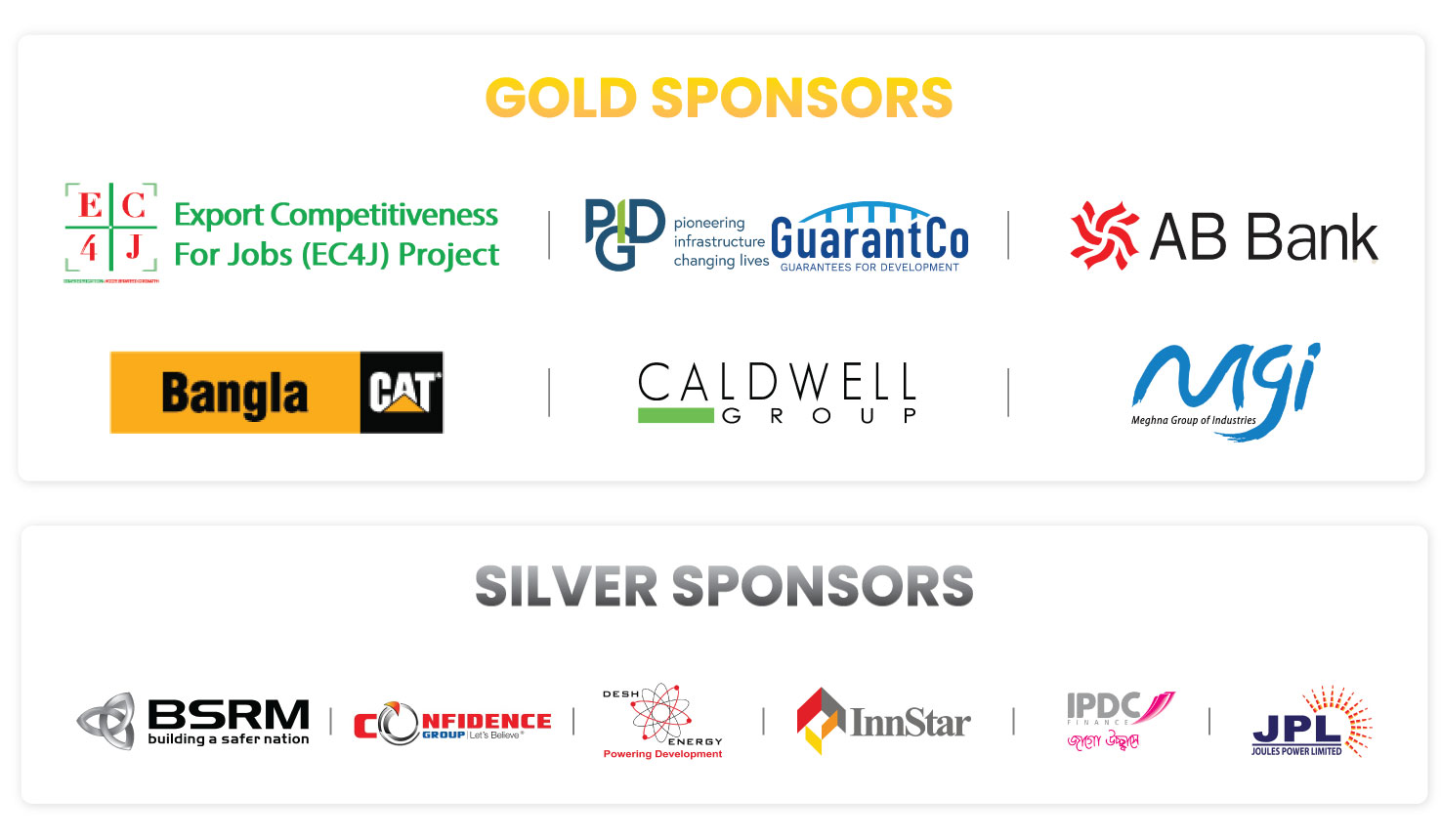
Concept Note
Introduction:
Bangladesh, the natural gateway between ASEAN and South Asia within a strategic location, is one of Asia's most remarkable success stories propelled by consistent development record, prudent macro-economic management, robust growth in foreign trade, investment, and commendable progress on socio-economic fronts. Until the pre-COVID time, Bangladesh was globally positioned as the development role model as an economic surprise marking 8% plus growth and steering the journey towards economic transformation.
Asia is the new economic frontier and Bangladesh is a part of it in the 21st century. Bangladesh is in a position to transform itself into a modern economic powerhouse likewise many countries including the Asian Tigers. Bangladesh has been progressing globally with commendable achievements over the past decades.
Despite COVID-19 stress, Bangladesh has registered remarkable 5.47% GDP growth in FY2021 respectively backed by strong economic fundamentals, international trade base, resilience absorbing economic shock and became the 3rd largest growth performing economy in 2020 as per the IMF. In addition, Bangladesh’s per capita income is estimated to increase to US$ 2,227 in FY 2020-21 marking 9% growth. While global trade declined by 5.3% (in 2020). Bangladesh made a 15.1% growth in export trade. Our growth could have been larger if the global supply chain system remained uninterrupted.
Following this growth momentum, our economy is expected to rebound in 2021 propelled by V-Shaped recovery. The consistent economic performance enabled us to meet the eligibility of the UN Committee for Development Policy (CDP) to graduate into a developing country by 2026. Robust economic progress will steer Bangladesh to become a developed country by 2041.
Witnessing the unprecedented growth of Bangladesh, leading MNCs like Goldman Sachs, McKinsey, UBS are highly ambitious about Bangladesh. HSBC projects Bangladesh to be the 26th largest economy by 2030, While, PWC projects us to be the 28th largest economy in 2030 and the 23rd largest economy by 2050. The pace at which the country’s economy is progressing, it is only rational to conclude that the country will surpass these projections by the stipulated time.
Trade and investment landscape:
The fully operational 9 Export Processing Zones (EPZs), plan for 100 Economic Zones (EZ), One-Stop Service, tax holiday facility up to 33 sectors, competitive labor force, demographic dividend, political stability, outstanding return, growing infrastructure development, technological advancement, and competitive investment incentives have been considered as ‘growth enablers’ for Bangladesh, branding Bangladesh as a favorite destination for trade and investment regionally. The private investment to GDP ratio in Bangladesh reached 23.63% whereas the overall investment to GDP ratio reached 31.75%. The private investment to GDP ratio is projected to be 40% in the next decade, 32% in the 8th five-year plan. Trade growth is also projected to reach USD 100 billion in the 8th Five Year plan. Diversified manufacturing and service sectors, especially the Readymade Garments & Textiles, Leather goods, Pharmaceuticals, Light engineering, Plastic Products, Agro & Food processing, IT & ITES, Electronics, 4IR technology, and other non–traditional and emerging manufacturing sectors offer rewarding and competitive investment leverage for foreign investors and traders. Our pro-business atmosphere always renders a win-win state for all investors and traders.
The confidence of the global investors in Bangladesh has increased as some bold and strategic reforms are consistently being taken considering the changing geo-economic dynamics and private sector needs. EZ is a milestone in industrial ecosystem development that will act as an economic impetus for the country attracting FDI, facilitating jobs creation, promoting export diversification, and spilling positive impacts on local industry. So far, 93 EZ sites were identified which are in progress. BEZA has already received investment commitments from the world’s leading companies like Nippon Steel and Sumitomo Metal, Honda Motor Corporation, of Japan, Procter & Gamble (P&G) invested in EZs. Despite pandemic stress, FDI in Bangladesh has reached USD2.37 billion in 2020 amidst of global FDI downturn. These endeavors caused a paradigm shift in the economic atmosphere of Bangladesh upholding the inclusive development spirit of the Father of the Nation. To continue economic momentum towards the trajectory by 2041, game-changing avenues of the economy ranging from substantial infrastructure, industrial growth, infrastructure development, digitalization, market concentration, and blended and sizable financing are essential. International trade of country accounts for around 34% of GDP performing indispensable roles to steer our relentless socioeconomic development spree. Trade has also reshaped our economic position into a global trade map in many products. With this confidence and enlarging opportunities, both opportunities for international trade and investment can go in tandem and may generate many economic premiums in the days to come.
Against this backdrop, commemorating the Birth Centenary of the Father of the Nation Bangabandhu Sheikh Mujibur Rahman, 50 years of the independence of Bangladesh and orienting knowledge economy backed by digitalization, DCCI, the most vibrant chamber in Bangladesh, undertook an opportune move to rejuvenate the global trade and investment fraternity. In this regard, DCCI will organize a week-long International Investment Summit virtually to deepen collaboration of Bangladesh with the investors from the 5 regions; Americas, Europe, Middle East and West Asia, Asia & Pacific and Africa, for exploring trade and investment opportunities from 26 October to 1 November 2021 (Tuesday to Monday) in Dhaka, Bangladesh through virtual platform to ensure the global participation of the investors of different continents.
Objectives of the Summit:
Event itinerary:
Given these objectives, the summit is going to be jointly organized by the Ministry of Commerce, the Government of Bangladesh, and DCCI. The summit will congregate top policymakers of Bangladesh, leaders of successful companies and leading investors, business analysts, CEOs of large conglomerates, multilateral agencies from all over the world to harness investment treasure.
H.E. Sheikh Hasina, Honourable Prime Minister, Government of the People's Republic of Bangladesh will join as the Chief Guest in the inaugural ceremony of the Summit and other dignitaries will join in different sessions of the Summit.
This week-long investment summit includes 9 sectors underscoring critical enablers and avenues of the economy, demanding massive investments especially in Infrastructure (Physical, logistics & Energy), IT/ITES & FINTECH, Leather Goods, Pharmaceuticals, Automotive & Light Engineering, Plastic Products, Agro & Food Processing, Jute & Textiles, FMCG & Retail Business. These areas of the economy seek greater attention and help to solidify the competitiveness of the country.
On Day 1, the Inaugural Ceremony will be held followed by B2B matchmaking where Bangladeshi enterprises will meet that of Africa and the Americas.
On Day 2, Webinar on Economic Tie of Bangladesh & Europe: New Regulatory Regime and it followed by matchmaking of Bangladeshi businesses with Asia & Pacific and EU investors, on Day 3, Webinar on LDC Graduation of Bangladesh: Transformation and Preparedness & Shaping Business Landscape: Economic Cooperation of Middle East & Bangladesh and it also followed by matchmaking of Bangladeshi businesses with Asia & Pacific, Middle Eastern and West Asian businesses, on Day 4, Webinar on Asia & Pacific and Bangladesh: Harnessing Economic Potentials and it also followed by matchmaking of Bangladeshi businesses with Asian businesses (Asia & Pacific), on Day 5, Webinar on Trade & Investment Cooperation of Africa and Bangladesh: Towards a new trajectory, on Day 6, Webinar on Bridging the infrastructure financing gap through credit solutions in Bangladesh and on Day 7, Closing ceremony with media briefing.
Total 450 B2Bs are expected to be taken place between the 500+ businesses of Bangladesh and other 5 regions.
